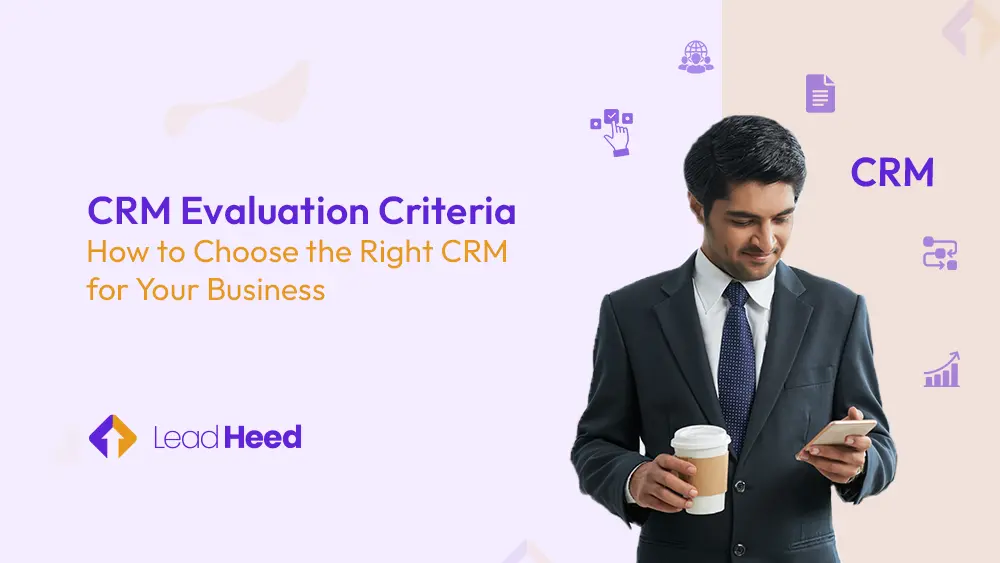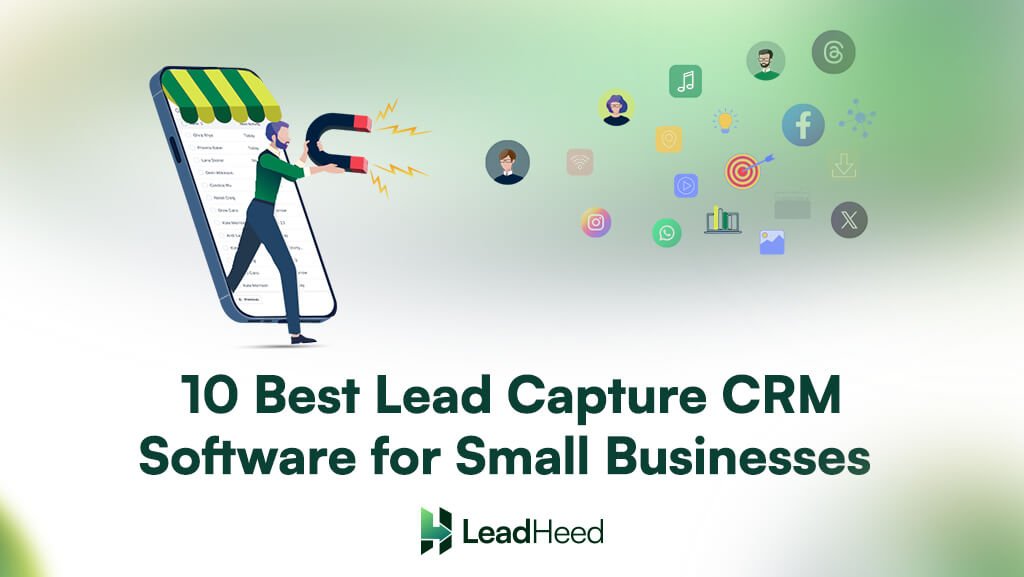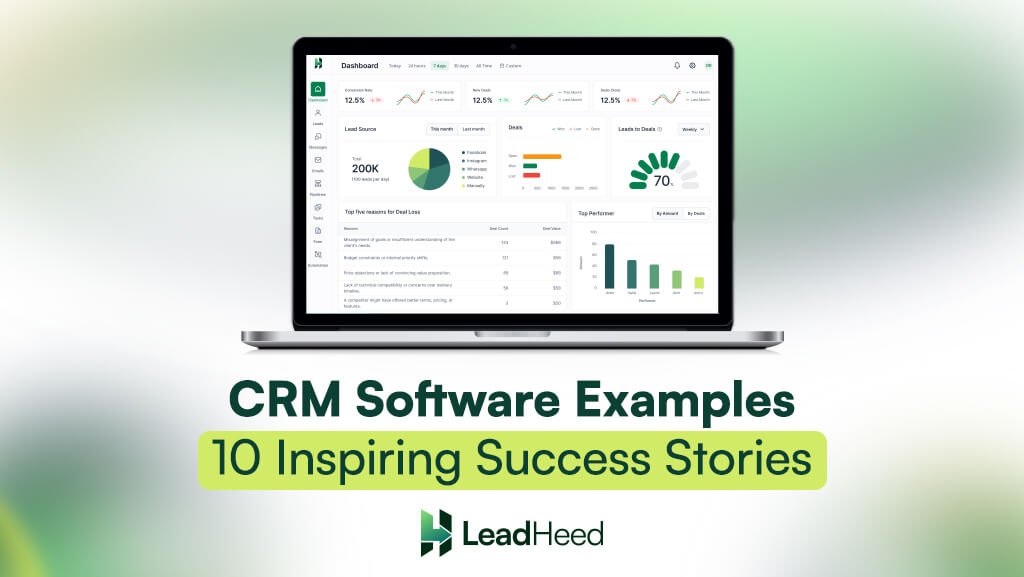Choosing the right CRM is never easy. Without clear CRM evaluation criteria, businesses often choose tools that don’t fit their needs. The wrong CRM wastes money, slows adoption, frustrates teams, and makes it harder to track customer data effectively.
Following the right CRM selection criteria helps you select a system that unifies data, improves teamwork, and boosts productivity for long-term growth. With the right system in place, you can streamline workflows, track performance accurately, and drive sustainable business growth.
This guide will show you how to select a CRM that boosts productivity and drives long-term growth.
Why CRM is Essential for Business Success?
CRM is essential for business success because it keeps all customer information in one place, automates repetitive tasks, and helps build stronger relationships. With a CRM, teams can see the full customer journey, work together better, and avoid mistakes from scattered data.
A good CRM also helps you work faster, make smarter decisions using data, increase sales with personalized offers, and keep customers happy with proactive support.
1. Customer data
Instead of managing multiple spreadsheets or scattered records, a CRM keeps all your customer information in one place. This single source of truth ensures each team member has accurate, updated data so that you can make faster, more informed decisions.
2. Stronger relationships & increased sales
You can see the whole customer journey. This helps you personalize interactions, anticipate needs, and follow up at the right time. This builds trust, boosts satisfaction, and ultimately drives higher sales conversions.
3. Improved productivity
A CRM automation replaces repetitive tasks like data entry, lead assignment, and follow-up reminders. This allows your team to focus on high-value activities that directly contribute to business growth.
4. Smarter decision-making
Built-in analytics and reporting give you real-time visibility into sales pipelines, campaigns, and customer behavior. These insights enable informed decisions that support strategy and revenue projections.
5. Better customer retention
A well-chosen CRM helps you monitor interactions, identify at-risk customers, and provide proactive support. Consistent engagement strengthens loyalty and reduces customer drop-offs.
Key CRM Features to Look for During Evaluation
When you evaluate CRM software, the features you prioritize will directly impact how well it supports your growth. A strong CRM should offer contact management, automation, analytics, integrations, mobile access, and collaboration. These features ensure you manage relationships effectively, streamline workflows, and keep your business moving forward.
1. Contact & lead management
Contact management is a feature that lets you organize calls, emails, meetings, and customer preferences into a single profile. With clear lead management, you can track every prospect, nurture relationships, and prevent opportunities from slipping through the cracks.
2. Sales & marketing automation
Automation is a built-in feature that saves you time and removes manual errors. A good CRM can send follow-ups, score leads, and assign prospects to the right salesperson automatically. This helps you focus on building relationships while the system handles repetitive tasks.
3. Reporting & analytics
You need access to real-time dashboards and detailed reports. A CRM with strong analytics helps you measure campaign ROI, sales performance, and customer behavior. These insights let you refine strategies quickly and make data-driven decisions that improve results.
4. Integrations with other tools
A CRM connects seamlessly with the tools you already use. Whether it’s email, accounting, or marketing tools, integrations eliminate duplicate work and reduce gaps in data. With a connected system, you gain smoother workflows and a complete view of your business.
5. Mobile access
Mobile access is another essential feature. A mobile-friendly CRM lets you check customer data, update opportunities, and follow up instantly. This keeps your team responsive, even when working remotely or meeting clients in the field.
6. Collaboration features
A strong CRM promotes teamwork with built-in collaboration tools. You can share notes, assign tasks, and track progress across departments. This ensures your entire team stays aligned, avoids miscommunication, and works toward the same customer experience goals.
Essential CRM Evaluation Criteria for Choosing the Right Software
Choosing the right CRM is vital to keep your business efficient, scalable, and profitable. To make the right decision, you must evaluate software on usability, customization, integration, scalability, analytics, security, vendor support, and cost. These criteria ensure the CRM supports adoption, improves workflows, protects data, and delivers strong ROI.
1. Usability and ease of adoption
Even the best CRM won’t be effective if your team finds it hard to use. Adoptability is the most significant factor in the success of a CRM. Ensure that there are clean dashboards, intuitive navigation, and minimal technical complexity. A product that requires weeks of training can intimidate adoption and lead to wastage of investments.
Instead, seek products that offer guided onboarding, tutorials, and live support. The more intuitive and straightforward the system, the faster your employees will become proficient, thereby boosting productivity and long-term CRM ROI.
2. Customization and flexibility
Another essential factor to consider is customization and flexibility. A flexible software lets you customize pipelines, fields, dashboards, and automation rules so it adapts to the way your employees already work.
For growing businesses, the ability to customize the system as business strategies evolve is crucial. Look for CRMs with advanced personalization and make updates easy to implement. This will allow your CRM to grow with your business and still deliver optimal return on investment.
3. Integration capabilities
CRMs rarely operate in isolation. Your employees already use tools like email, marketing automation, accounting software, ERP systems, or help desk solutions. Without strong integrations, workflows are broken and gaps appear in data. A well-integrated CRM makes data sharing simple, removes duplicate entries, and minimizes errors.
When choosing a CRM, look for open APIs, app marketplaces, and pre-built connectors. These features help ensure it works well with your current technology.
4. Scalability and future growth
A CRM you adopt should grow with your business. Scalability ensures to keep up with increased amounts of data, users, and features as your company expands. A solution that is good for a five-person team may not handle a 50-person sales force.
Select CRMs that offer tiered pricing, modular add-ons, and enterprise-level functionality. Scalable solutions save you the cost of future migrations, meet your short-term needs, and prepare you for long-term business expansion.
5. Analytics and reporting
Data is one of your most valuable assets, and a CRM needs to convert it into actionable insights. Good reporting features help your company monitor performance metrics, track KPIs, and measure customer behavior. Real-time dashboards offer instant access and visibility into pipelines, while predictive analytics facilitate revenue forecasting and risk identification.
Reporting can be customized to allow each department to focus on what is most important to them. Without reliable analytics, businesses are unable to develop effective strategic plans. Choosing a CRM that offers robust reporting tools enables more informed decisions, enhanced strategies, and sustained growth.
6. Security and compliance
Customer data is private, and it must be protected. A CRM must possess good security features like encryption, role-based access, and two-factor authentication. Compliance with global laws such as GDPR or HIPAA is also crucial.
Without proper protection, organizations are exposed to fines, breaches, and lost customer trust. Evaluate how vendors approach backups, audits, and security patches. A CRM with robust compliance features not only protects your data but also portrays professionalism and builds long-term client trust.
7. Vendor support and reliability
A CRM is only as powerful as the support behind it. Even with user-friendly platforms, technical issues, questions, or training needs will crop up. Reliable support ensures quick problem-solving and minimal downtime. Look for vendors that provide 24/7 support, training documentation, and community forums.
Beyond customer service, consider the vendor’s reputation, uptime guarantees, and update frequency. A reliable partner will proactively enhance the system and guide you through setup, scaling, and optimization.
8. Cost
When choosing a CRM, cost isn’t just the monthly subscription. Consider the total cost of ownership (TCO), including setup, customization, training, add-ons, and future upgrades. A CRM that seems cheap at first can become expensive over time if hidden costs exist. Evaluating cost is essential to ensure the CRM fits your budget while providing long-term value and a strong return on investment.
How to Evaluate CRM Software Effectively?
Evaluating CRM software effectively means following a structured process that ensures you choose a system that matches your goals. By identifying business needs, defining evaluation criteria, shortlisting options, testing, gathering feedback, and finalizing with approvals, you can secure a CRM that delivers adoption, ROI, and long-term growth.
To achieve this, you can follow these key steps:
1. Identify business needs
Start by clarifying what problems you want the CRM to solve. Is your sales team losing leads? Do you lack visibility into pipelines? Are manual processes slowing productivity? Clearly defining pain points and objectives ensures you focus on solutions that directly support your goals rather than chasing unnecessary features.
2. Define CRM evaluation criteria
After identifying needs, make a list of evaluation factors. Include usability, integrations, scalability, reporting, and cost. These CRM criteria will guide your decisions and help you compare solutions fairly.
3. Research and shortlist CRM options
Explore available solutions and filter out options that don’t meet your must-have requirements. Check vendor websites, customer reviews, industry forums, and analyst reports. You should shortlist 3–5 CRM platforms that align with your defined needs and budget.
4. Test and compare CRM solutions
Most vendors offer free trials or live demos; take advantage of them. Hands-on testing reveals whether the CRM is truly user-friendly, integrates with your tools, and fits your workflow. Compare shortlisted CRMs side by side, paying attention to both features and overall usability.
5. Collect team feedback
The success of a CRM depends on adoption. Involve end users, sales reps, marketing teams, and support staff in the evaluation process. Gather feedback on ease of use, speed, and functionality. If the CRM doesn’t work for them, adoption will suffer, no matter how advanced the features are.
6. Make final recommendation
After testing and gathering feedback, narrow your choice to the best-fit CRM. Consider long-term scalability, vendor reliability, and total cost of ownership. Keep a record of why you chose it to get approval and show it supports your business goals.
7. Seek approval for implementation
Finally, present your recommendation to stakeholders and decision-makers. Highlight how the CRM aligns with business goals, the expected CRM ROI, and the feedback from end users. Once approved, create a clear rollout plan that includes training, onboarding, and performance tracking for smooth implementation.
|
Boost Your Sales and Streamline Customer Management with LeadHeed. |
Common Pitfalls to Avoid During CRM Evaluation
During CRM implementation, mistakes can cause poor adoption and wasted resources. Ignoring usability, neglecting integrations, or underestimating costs creates inefficiencies and frustration for your team. By tackling these challenges early, you ensure smooth implementation.
1. Focusing only on features, not usability
CRMs with many features can be tempting, but complexity can hinder adoption. Focus on user-friendly interfaces, straightforward workflows, and low learning curves so your teams will actually use the CRM daily.
2. Ignoring integration needs
CRMs must integrate with your existing tools, like email solutions, ERP, marketing automation, or customer service software. Failing to consider your integration capabilities leads to gaps in data, duplicated effort, and errors. Ensure the CRM integrates seamlessly with your tech stack for optimal functionality.
3. Overlooking scalability
Ignoring scalability leads to costly migrations or limitations on users, storage capacity, or more sophisticated features. Choose software that expands with your business to avoid future disruption.
4. Neglecting the total cost of ownership
The initial subscription fee is only a portion of the bill. Most CRMs have additional expenses like implementation, training, customisation, add-ons, and upgrades. Failing to consider the full TCO can strain your budgets and reduce ROI.
5. Underestimating data security and compliance
When your CRM lacks proper security or compliance (like GDPR or HIPAA), your business risks violations, penalties, and reputational damage. Always prioritise vendors that have reasonable security measures in place and regulatory compliance.
Conclusion
Selecting the right CRM makes your work easier and your customers happier. Using clear criteria like ease of use, integrations, security, and cost helps you choose a system that fits your team. LeadHeed helps you do just that, keeping your team organized, your customers happy, and your sales on track.
It keeps all customer info in one place, automates repetitive tasks, and helps everyone work together. By testing options and planning carefully, you can boost sales, save time, and grow your business.
FAQs
What are CRM evaluation criteria?
CRM evaluation criteria are structured benchmarks for comparing software that cover usability, scalability, integrations, cost, and customization. Using these ensures your CRM fits your business goals effectively.
Why is it important to use CRM evaluation criteria?
CRM evaluation criteria provide a roadmap for more intelligent decisions, reduce risks, improve adoption, and maximize ROI. This structured approach ensures long-term CRM success.
What are the most important factors to consider when evaluating a CRM?
When applying CRM evaluation criteria, focus on usability, flexibility, and integrations. Also assess analytics, vendor support, scalability, and security. These elements determine if a CRM truly meets your needs.
How do I create a CRM evaluation checklist?
Create your CRM evaluation checklist by outlining goals and must-have features, including usability, reporting, automation, and integrations. Use it to compare options consistently and avoid bias.
What common mistakes should I avoid when evaluating a CRM?
Many ignore usability and integration when applying CRM evaluation criteria. Others underestimate cost or security risks. Forgetting team feedback often leads to poor adoption.
Can small businesses benefit from CRM evaluation criteria?
Yes, CRM evaluation criteria are helpful for small businesses. They help select affordable, easy-to-use systems. This boosts efficiency, customer retention, and long-term growth.



